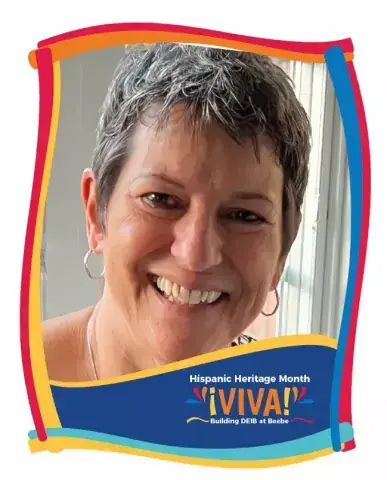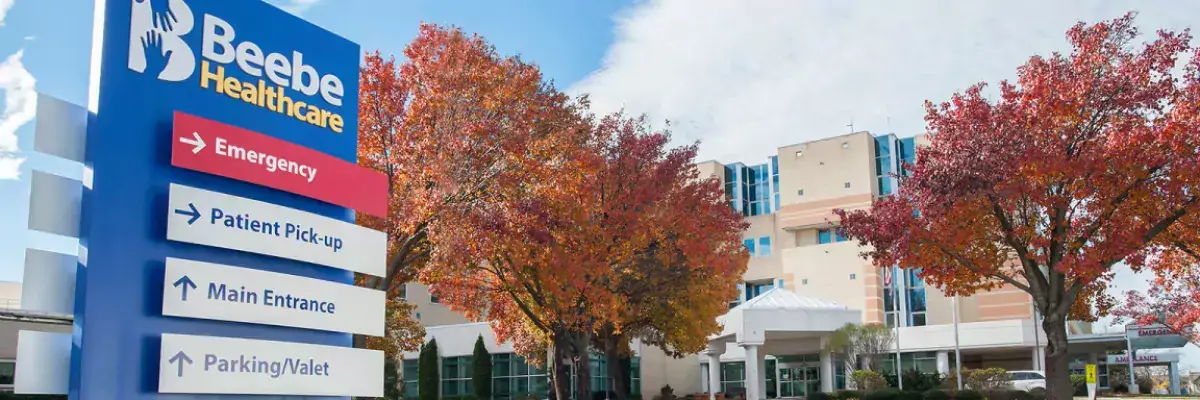Hispanic Heritage Month

Hispanic Heritage Month recognizes the achievements, contributions, and cultural diversity of Latinos in the United States. At Beebe, we’re committed to advancing patients’ access to culturally and linguistically competent healthcare services. By removing language barriers, we are able to ensure high-quality and compassionate patient care.
Alina Ferrer, Beebe’s lead healthcare interpreter, oversees interpreting services. She recently celebrated 20 years of relaying critical information to Spanish-speaking patients. Cuban-American, she is committed to enhancing language access in healthcare, and she serves as board president of La Esperanza community center.
How do you describe your cultural identity?
I strongly identify as being Cuban American. I was born in this country but was not raised in a traditional American household. My family raised us as Cuban in Annandale, Virginia. To this day, we speak Spanish at home.
What are some of your favorite family or cultural traditions?
Nochebuena, which is Christmas Eve, is definitely one of our biggest celebrations. My mother always said that if you don’t come home any [other] time of the year, that’s fine, but you have to come home Christmas Eve. We still do all the traditional cooking, food, and festivities. The past few years have been a true honor, as I’ve taken over the majority of the cooking responsibilities.
That’s been a growing experience – I’m not quite the cook – but I will always have traditional food on Christmas Eve. For us, that’s pork with naranja agria, which is a sour orange marinade, and yuca with mojo, black beans and rice, and fried plantains. For dessert, we have either flan or turrón (Spanish nougat).
What are some of the challenges you have faced and overcome in relation to cultural identity?
My first language was Spanish. My sister is older than I am, so when she went to school, I started learning English from her. When I started going to school, back in the late ’60s, there wasn’t as much cultural awareness and acceptance and diversity as there is today. My greatest challenge was that I didn’t want people to know my primary language at home was Spanish. I would tell my parents, “Don’t speak Spanish at school visits.” As I’ve gotten older, I am just so incredibly grateful that we did maintain Spanish in our household. I’ve made a career out of it. Part of the culture is missing when the language is lost.
What can Beebe team members do to support Latino team members and patients?
First, be aware of and embrace the diversity in our culture. Second, recognize that there are so many more similarities among us than there are differences that divide us. Third, know that the Latino community that we see at Beebe is truly grateful for the services they receive.
How did you come to interpreting as a career?
I always say interpreting kind of found me. I was a social worker at Beebe back in 1999-2000 at Tunnell Cancer Center, and [I] used to get called a lot to different departments because I spoke Spanish. We didn’t have an interpreter or interpretation services back then. Over time, it became evident that there was this incredible need. My path took me in a different direction, and I left Beebe for about a year. I was then asked to interview for a role with the new interpreter services program being started. I recently celebrated 20 years as one of the interpreters – now we have four, including myself. The need continues to grow, and I’ve really found my niche in this profession.
What do you find rewarding about your work?
The people I meet and the patients who I work with – I truly have found a way to develop quite a bond with them. Because I’ve been at Beebe as an interpreter for 20 years, I meet patients every day whose children are now 20 years old, and I was with them during the delivery of that child. Everything comes full circle. It’s been a tremendous gift to be a part of these individuals’ lives for a generation.
Why are translations and interpretations important for Beebe?
To provide appropriate healthcare – and equitable healthcare – we need to have communication. I can’t imagine a provider being able to do an appropriate assessment without it. We talk about healthcare disparity, and having an interpreter meets those criteria for good communications, good assessment, and overall patient care – it’s crucial; it’s a must-have.
What is a key attribute that’s important to you as a leader?
I always say I try to live by example. When people see me, I would like them to say I’m living the life I say that I’m living – I’m walking the walk, talking the talk. I aim to present who I truly am even though I don’t need to continually verbalize it.
Tell us something about yourself that might surprise us.
Not only am I a part of the Latino community here in Sussex County, I am also part of the LGBTQ community. The community in Sussex County is very open and welcoming. I don’t think we realize that until we go elsewhere and feel stigmatized or fearful in some cases. Living here in Sussex County has really nurtured that part of me because it is so inclusive. Even though I come from an urban area, I think that what you find in Sussex County is a true gem.


